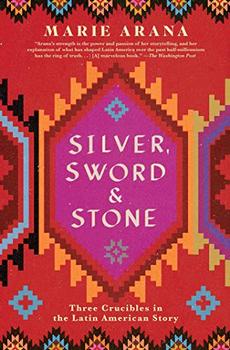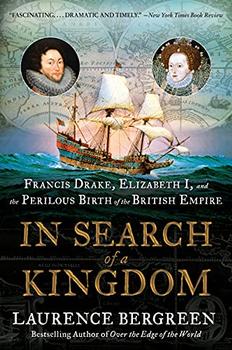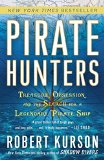Summary | Excerpt | Reviews | Beyond the book | Read-Alikes | Genres & Themes | Author Bio

Critics' Opinion:
Readers' Opinion:
First Published:
Aug 2019, 496 pages
Paperback:
Aug 2020, 496 pages
 Book Reviewed by:
Book Reviewed by:
Rose Rankin
Buy This Book
With debates over immigration from Latin America raging in the United States, now is the ideal time for a book that can deepen our understanding of why the region is in the midst of continuous upheaval, and why so many of its residents risk everything to come north. Marie Arana's book, Silver, Sword & Stone, is therefore a timely response to uninformed fears and partisan rhetoric about Latin American peoples, even though she makes no policy recommendations nor does she address the current immigration situation. Rather, this book explores the indelible marks left on this region by its history.
This story is told through three themes, all of which pre-date European conquest but were amplified and modified by it: the region's precious metals, pervasive violence and organized religion. While these may seem reductive—boiling down a complex array of cultures to three strands of society—Arana's structure lets her plumb the depths of the cultural richness of Latin America by focusing on the myriad ways these forces have influenced the past and present and, by extension, will continue to influence the future.
In each of the three sections, Arana introduces the reader to a contemporary Latin American. In the section on mining and metals ("Silver"), it's a destitute Peruvian miner; then a former guerilla-turned-drug dealer from Cuba in the violence chapter ("Sword"); and lastly a Spanish Jesuit missionary who adopts his Bolivian home in the religion chapter ("Stone"). Once introduced, the author leaves the contemporary narrative and begins telling the history of the huge and varied lands from the Rio Grande to Tierra del Fuego, periodically returning to the contemporary person to show how the theme of the section plays out in their life today.
The history Arana recounts reaches back much farther than Columbus. Thousands of years ago, when the Incas, Mayans and numerous other societies had advanced hierarchical government and social structures, gold and silver were mined and used as finery by the elite. The obsession of Spanish conquistadors for these precious metals, however, exploded upon the New World in the early 16th century and drove the stunning overthrow of those sophisticated societies. It led to the extraction of unimaginable wealth, which flowed back to the Old World and eventually facilitated the Industrial Revolution as Britain and Spain competed for wealth and status over centuries of colonization.
Arana chronicles the brutal Spanish colonial regimes that forced Indigenous people into dangerous, toxic mines. She also discusses Portuguese colonialism in Brazil, but the emphasis is on Spanish territories. The rapacity is astounding, the cruelty disturbing, and Arana shows how this lust for shiny metals established a pattern of extractive economics that takes resources of all kinds—oil, crops, livestock, as well as metals—from the lands where they're found and transfers them to foreigners who profit from them.
From there, the author loops back to pre-conquest times in the Sword section on endemic violence in the region, unflinchingly cataloging the human sacrifices, cannibalism and conquests that Indigenous societies inflicted upon each other. Arana eschews portrayals of the Indigenous peoples as "good" or "peaceful," but instead acknowledges that while violence didn't originate with European colonizers, they expanded it to an industrial scale.
She follows this story past the colonial period to the bloody revolutions, counter-revolutions, "dirty wars" and drug-trade-fueled butchery of the 20th and 21st centuries. At times it's overwhelming, and the reader shouldn't hesitate to put down the book momentarily, if only to absorb and recover from the horrific cruelty on nearly every page. Arana is right not to shrink from it though, since many American readers may not know of the role their own country's government played in sponsoring so much of this bloodshed. These historical truths need to be more widely discussed in the U.S. to foster understanding of our hemisphere's politics.
After so much blood-soaked terror, the section on religion offers little absolution. The Catholic Church was instrumental in the violent conquests of the colonial period, and while figures like Bartolomé de las Casas argued in European courts for mercy towards the Indigenous (see Beyond the Book), the majority of conquest-era priests facilitated violence, or at least tolerated it from their countrymen who enslaved the Indigenous population. Again, the author is clear-eyed about the human sacrificial rites that pre-dated the conquistadors, and she deftly shows that organized, hierarchical religions have been a mainstay of Latin American cultures for thousands of years.
She finishes with the rise of Protestantism and the tradition of fusing faiths into Christian and polytheistic hybrids, such as worshiping the natural world as well as Jesus and the Virgin Mary, which took place throughout Latin America (where Catholicism is predominant today), particularly in rural regions. Arana leaves the reader with the distinct feeling that regardless of the name or the particular ceremonies, the tradition of organized religion and deep spirituality will endure.
Each time the contemporary person's thread reappears, the author has provided more historical background that places their life in a richer context. It is a non-linear structure that brings the entire social tapestry full circle through time, and it allows the reader to witness how these themes carry through from the historical record to present-day challenges of everyday people.
Her mellifluous, evocative language also mitigates the cruelty that dominates so much of the story—for example, tying together an Incan emperor and penniless miner by describing how "both ended their time on earth as casualties of fortune, victims of an alien lust." Her use of language is both a salve and reward to the reader through often painful histories.
The multi-layered structure and depth of detail make the book as engrossing as it is informative, and while Arana avoids prescriptions for the future or current policy, her message is clear—exploitation, violence and religion define Latin America, and for change to come, these legacies will require a reckoning that the world has been unprepared thus far to make.
![]() This review was originally published in The BookBrowse Review in September 2019, and has been updated for the
September 2020 edition.
Click here to go to this issue.
This review was originally published in The BookBrowse Review in September 2019, and has been updated for the
September 2020 edition.
Click here to go to this issue.

If you liked Silver, Sword, and Stone, try these:

by Laurence Bergreen
Published 2022
In this grand and thrilling narrative, the acclaimed biographer of Magellan, Columbus, and Marco Polo brings alive the singular life and adventures of Sir Francis Drake, the pirate/explorer/admiral whose mastery of the seas during the reign of Queen Elizabeth I changed the course of history.

by Robert Kurson
Published 2016
Fast-paced and filled with suspense, fascinating characters, history, and adventure, Pirate Hunters is an unputdownable story that goes deep to discover truths and souls long believed lost.





The Flower Sisters
by Michelle Collins Anderson
From the new Fannie Flagg of the Ozarks, a richly-woven story of family, forgiveness, and reinvention.

The House on Biscayne Bay
by Chanel Cleeton
As death stalks a gothic mansion in Miami, the lives of two women intertwine as the past and present collide.

The Funeral Cryer by Wenyan Lu
Debut novelist Wenyan Lu brings us this witty yet profound story about one woman's midlife reawakening in contemporary rural China.
Your guide toexceptional books
BookBrowse seeks out and recommends the best in contemporary fiction and nonfiction—books that not only engage and entertain but also deepen our understanding of ourselves and the world around us.